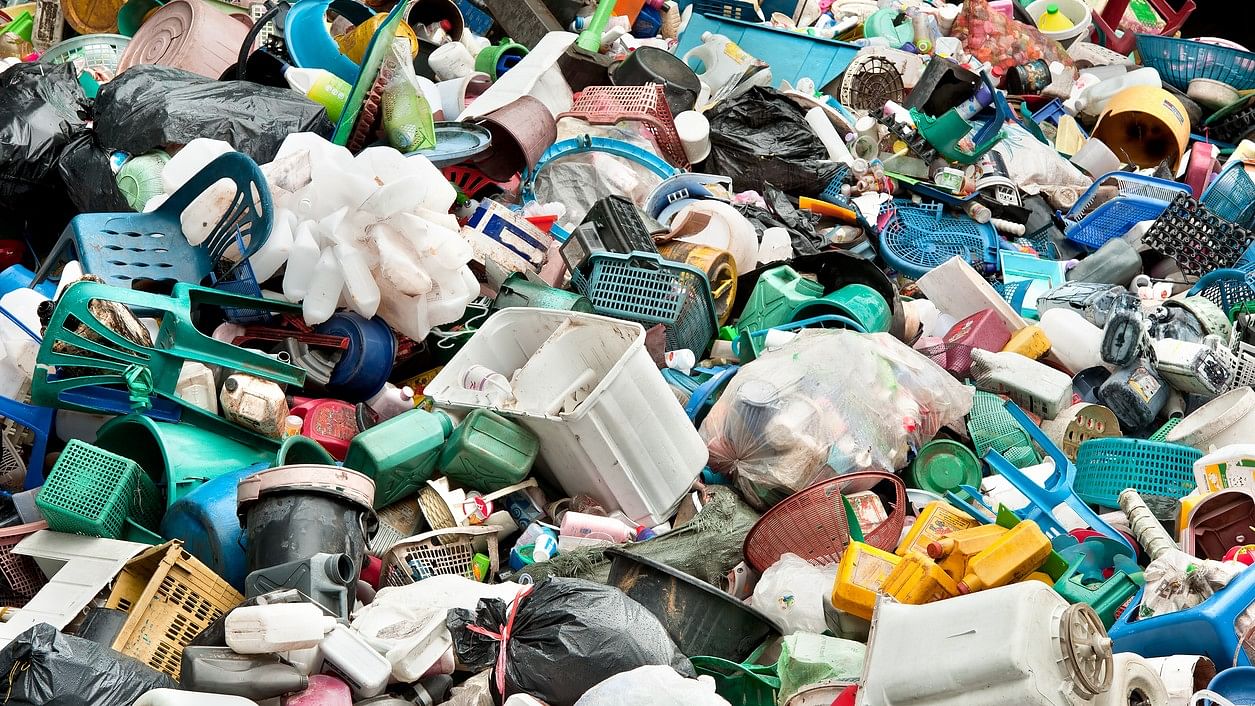
Representative image.
Credit: iStock Photo
The Swedish word plocka upp, or pick up, and the English word jogging were merged to form the word plogging. It started in 2016 as an organised volunteering activity of picking up litter while jogging in Sweden and soon spread around the globe. If we jog our memory, we’ll recall a video of our Prime Minister picking up trash from a beach in Tamil Nadu. “Plogging at a beach in Mamallapuram this morning. It lasted for over 30 minutes,” he tweeted. “Let us ensure our public places are clean and tidy. Let us also ensure we remain fit and healthy.”
Such photo-ops are a part of a ‘looking green, talking plastic’ policy. And the starkest example of it is India’s rather dubious positioning in the Global Plastic Treaty negotiations, the next round of which is coming up in November. While the plastic footprint of developed countries is decidedly larger, by sabotaging the treaty, India appears intent on undermining the need for collective global action. “India is disregarding science, undermining the urgency of the environmental crisis, and sidestepping accountability for its own contributions to plastic pollution,” says Satyarupa Shekhar, a public policy advocate closely following the plastic treaty. Far from cutting down, India’s Commerce Minister has urged the plastic manufacturing industry to become the world’s premier supply hub by enhancing its economic activity from the current Rs 3 lakh crore per annum to Rs 10 lakh crore per annum in five years.
As such, plogging and clean-ups are a façade of environmental consciousness, distractions from real solutions. It is symptomatic of the manner in which we deal with plastic pollution in public policy—a litter problem. We have reduced the plastic crisis to matters of cleanliness, as reflected in the Single Use Plastic Ban’s narrow focus on post-consumer waste management. The ban holds street vendors and small shopkeepers accountable for the use of plastic bags and cutlery, while leaving the fast-moving consumer goods (FMCG) companies and petrochemical manufacturers undisturbed.
A survey conducted among over 2,000 street vendors in seven cities across five states in 2023 revealed that though the smallest retailers are convenient targets for bans and punitive measures, they exhibit a positive inclination to address the crisis. A notable 63 per cent of respondents expressed a firm commitment to completely cease the use of single-use plastic, signalling a significant readiness to adopt environmentally friendly alternatives. Most respondents also highlighted the importance of production-side regulations, which shows an acute awareness of the plastic crisis being a supply-side problem. Most importantly, they identified the need for accessible, affordable alternatives and rightly pointed out that these had been replaced directly by plastics or indirectly by public subsidies to the plastics and petrochemicals industry.
A systemic shift will occur only when we have production caps and eliminate subsidies that are enabling the indiscriminate expansion of the petrochemical industry. Instead, the Ministry of Environment, Forest, and Climate Change (MOEFCC) has ruled that onshore and offshore oil and gas exploration no longer requires an Environment Impact Assessment (EIA) report, public hearing, or clearance from the Ministry. In fact, the government has also granted tax benefits to the petrochemical industry, such as reduced or exempt excise duty, customs duty, and value-added tax (VAT) on certain products. Again, in order to benefit the FMCG giants, despite multilayered packaging (MLP) being banned in 2016, it was not included in the Single Use Plastic Ban 2022. Finally, Extended Producer Responsibility (EPR) could have promoted the liability of producers for plastic pollution, thereby providing the impetus to shift to reuse and redesign, but the complete lack of transparency on reporting and mandatory targets meant that it is a lost opportunity.
It is rather unfortunate how we are squandering the opportunity presented by the Global Plastics Treaty. While India has long surrendered bits and pieces of our sovereignty at the altar of neoliberal policies advocated by the World Bank and the International Monetary Fund, in the plastic treaty negotiations, it has invoked the idea of “sovereignty” to argue for nationally determined measures instead of collective agreements. India has also opposed any limitations on production of primary plastic polymers or virgin plastics by calling such restrictions to be detrimental to our economic growth. As we approach the fifth round of negotiations in the Global Plastic Treaty in Busan, South Korea, next month, it is unlikely that there will be a positive step towards an effective treaty. A “like-minded group” constituting India, along with Saudi Arabia, Kuwait, Iran, and China, is likely to continue to scuttle discussions on plastic production caps or cuts. And this won’t change unless more of us are willing to meaningfully engage with this issue.
(The writer is a researcher and writes on public policy and socioeconomic issues)